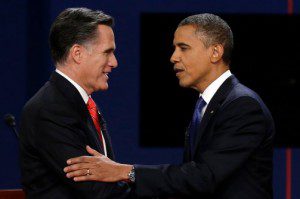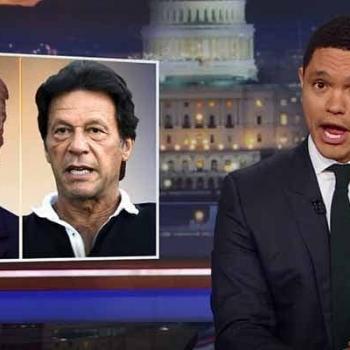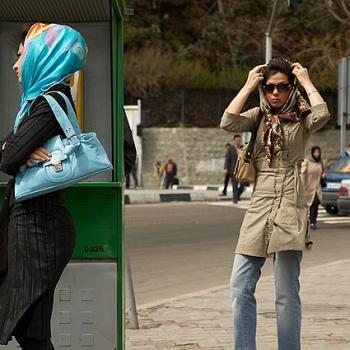The debate tonight comes at an important time — issues in the Middle East with global significance are developing by the day. Recent events, like the violent protests in Libya and Egypt, Iran’s growing nuclear program and massacres in Syria have brought the candidates’ respective foreign policies, a fringe issue thus far in the 2012 election, to the forefront.
Since the killing of Osama bin Laden in May 2011, President Obama has held a strong lead over GOP candidate Mitt Romney in most foreign policy approval polls, though foreign policy took a back seat to the economy. In recent weeks, those polls have tightened. With the killing of four U.S. officials in Libya in September, foreign policy has at last intruded into the presidential campaign, previously dominated by domestic concerns. For a detailed analysis of the foreign policy positions of the candidates, see my policy brief at www.ispu.org.
Guiding Principles for Obama and Romney
President Obama’s foreign policy seeks to rely not on abstract moral values, or brute military strength, but on real relationships and shared interests with other nations. In his inaugural address in 2009, he made a case for this vision.
In Obama’s speech in Cairo in June of 2009, he preached co-existence and reconciliation, raising expectations that U.S. foreign policy would change in the Middle East but quietly embraced pro-American autocratic rulers, like President Hosni Mubarak of Egypt. While Obama voiced his preference for open governments, it was only after the tide had clearly turned during the Arab Spring in countries like Tunisia and Egypt that Obama implicitly called for a change of ruler.
Obama’s foreign policy, especially towards the Middle East, cares less about consistency and more about successful outcomes and maximizing American bargaining power. Contrasting from his predecessor, who relied on unilateral force to engineer change in the Middle East, Obama relies on practical considerations, consensus building, and a diversity of views from his foreign policy team.
A Romney administration, according to Republican sources would embrace the most hawkish of George W. Bush’s “freedom agenda” interventionists, particularly in the Middle East. He has assembled a team of neocon hardliners as advisors and potential appointees in a Romney administration that have encouraged more aggressive foreign policy positions criticizing the Obama administration for being “at the mercy of events, rather than shaping events.”
Romney has charged Obama with failing to lead on the world stage, supposedly making Americans less safe, accusing him of weakening the country’s global leadership. Romney’s much anticipated foreign policy address at Virginia Military Institute on October 8 was unfortunately short on details of his specific plans. Instead, he offered platitudes and broad critiques to Obama’s record. Romney argued for a more assertive foreign policy where the U.S. leads from home. For example, he suggested that he would support arming the Syrian rebels in their attempt to remove Bashar al-Assad of Syria from power.
While he discussed Libya, Syria, Iran, the Palestinian-Israeli issue and al-Qaeda, it became increasingly clear to those who have been following his positions over the last year-and-a-half that Romney has changed his positions nearly wholesale in the last week and has essentially come to mimic Obama’s positions in foreign policy. Where Romney differs is that he plays on the emotions of Americans who fear terrorism but, significantly, his analyses lack evidence, evade clear steps to achieve his solutions, or provide misleading analyses of complex international issues and their root causes (some of which land squarely on Bush-era politics and the anti-Americanism it fueled).
To elect Romney as President of the United States, given his simplistic views of the world’s nuances, would not only be a detriment to America’s vital interests but also to the global village as a whole.
The Debate
Several recent issues will likely come up in tonight’s debate.
Nuclear Iran and the US-Israel Relationship
Romney has been blunt on his support for Israel and disapproving of Obama’s alleged indecisiveness and failure to adequately protect Israel from Iran’s development of a nuclear weapon. Obama has favored acting thorough diplomacy where Romney aides have said that he would support an Israeli strike on Iran. Israeli Prime Minister Benjamin Netanyahu and Romney have had a good relationship due to Romney’s open support of Netanyahu’s hard line views.
Netanyahu has continuously pushed Obama to be more aggressive in his stance towards Iran. However, as the polls have started to point towards an Obama reelection, Netanyahu has softened his previously aggressive rhetoric towards the President as his recent speech at the U.N. General Assembly showed.
Contrary to what Romney and Netanyahu claim, Obama’s muscular approach to Iran has exacted a heavy toll on the Iranian economy. To call Obama’s position towards Iran and his policies in the greater Middle East “appeasement” is patently false. His opponent is either posturing for political advantage or engaging in policies that would border on reckless endangerment.
Syria
While Romney has criticized Obama for his dealings with Syria, the GOP candidate has not provided specifics of how to deal with the crisis himself, except promising to provide the rebels with weapons. The Obama administration has clearly pushed any decisive action towards Syria down the road, though the administration has become more involved in supplying financial, logistical and intelligence support to the rebels. However, U.S. officials fear that providing arms to the rebels might fall into extremist hands. The Russians have complicated the matter further by opposing any sanctions or intervention against the Assad regime.
Libya
One of Obama’s most important foreign policy decisions of late was to attack Libyan dictator Moammar Gadhafi as he was leading a caravan towards Benghazi. When the Libyan uprising escalated in March of 2011, Romney initially criticized Obama for being “tentative, indecisive, timid and nuanced.” When Obama authorized limited U.S. military action, Romney then decided Obama had acted hastily. And when American forces helped remove Libyan dictator Moammar Gadhafi, Romney was first wary, then supportive.
With the killing of four diplomatic officials in September, including U.S. ambassador to Libya Christopher Stevens, Romney seized the opportunity to criticize Obama’s handling of the situation as apologetic and “disgraceful,” a severe miscalculation without providing evidence to substantiate his charge.
With questions about the influence of the anti-Islam film “The Innocence of Muslims” circulating, the debate surrounding possible limits on free speech when dealing with sensitive issues such as religion has also heated up. Obama reiterated the significance of uncensored free speech in his U.N. General Assembly speech.
Afghanistan/Pakistan
The controversial drone campaign under Obama has received increasing criticism about its effectiveness, now with a new report out by Stanford and NYU investigating the impact of drone strikes in Pakistan. A scathing criticism of the Obama administration’s use of drones, the report brought to light their terrorizing effect and simultaneous ability to increase the terror threat. Romney has been largely silent on the issue with many suggesting he would continue the drone war or escalate it. Romney has also accused Obama of tipping his hand to the Taliban by announcing a time line for withdrawal of U.S. troops from Afghanistan, but also says he accepts the 2014 time line.
What to watch for
As we watch the debate, we would do well to remember that a candidate seeking votes often has a very different perspective once in the Oval Office. In 2000, for example, then GOP candidate Bush campaigned on a call for humility in foreign policy and opposed nation building abroad. President Obama, for his part, campaigned against many of the national security initiatives of his predecessor while in reality being slow to end Bush’s 9/11 wars and scars, including closing the U.S. military prison at Guantanamo Bay and swiftly bringing U.S. troops home.
With American troops soon out of Afghanistan, the Obama administration is well positioned to play a key role in assisting Arab countries to transition to democracy. Washington should keep a sense of balance and perspective, with no knee-jerk reactions, as the Arab masses freed from years of oppressive control find their voice. Maintaining economic and political cooperation with appreciation of the sensitivities of new nationalism and identity politics is key to transforming U.S.-Arab relations from suspicion and hostility to cooperation.
Since his inauguration, Obama has had to clean up the damage caused by the Bush administration’s failed policies. It’s not surprising that his failures have been more apparent than his successes in damage control, which his opponent has attempted to exploit.
But the test of Obama’s presidency if he is re-elected is whether or not he can realign U.S. foreign policy with progressive and democratic voices in the region, making a structural investment in improving people’s lives.
Fawaz Gerges is a Fellow at the Institute for Social Policy and Understanding and a Professor of Middle Eastern Politics and International Relations at the London School of Economics and Political Science. For an in-depth examination of the candidates’ foreign policy positions, please see a new paper published by The Institute for Social Policy and Understanding.
This article is part of the “Election 2012 – American Muslims VOTE!” series, which is running on Altmuslim at Patheos, Altmuslimah, Illume, and Aziz Poonawalla’s news and politics blog on Patheos. Click on this special topics page to view all articles in this series and add your comments. Tweet your thoughts on this article, on the series, and on the 2012 elections at #MuslimVOTE.















